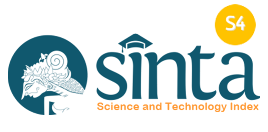IMPLEMENTASI PELATIHAN APLIKASI ZOTERO DI PERPUSTAKAAN UNIVERSITAS MUHAMMADIYAH YOGYAKARTA BAGI MAHASISWA MAGISTER ILMU PEMERINTAHAN
DOI:
https://doi.org/10.24269/pls.v3i2.2434Abstract
The purpose of this study is to describe how the implementation of the training zotero in Yogyakarta Muhammadiyah University Library. This research uses descriptive method qualitative approach. Data collection techniques in this study using observation, interviews, and documentation. The sampling technique used in the interview process is purposive sampling. The results showed that the material in the training conducted by the application zotero UMY library includes information about search, use zotero application for managing information, and utilization of information through the application zotero.
References
Fernandez, P. (2012). Library values that interface with technology: Public service information professionals, Zotero, and open source software decision making. Library Philosophy and Practice, 5, 1–11.
Grolimund, R. (2012). Citation and bibliography made easy with Zotero. Presented at the Rencontres Mondiales du Logiciel Libre, Geneva.
Hasugian, J. (2008). Urgensi Literasi Informasi dalam Kurikulum Berbasis Kompetensi di Perguruan Tinggi. 4(2), 11.
Istiqomah, Z. (2014). Perpustakaan di Era Keterbukaan Informasi: Sebuah Tantangan yang Harus Dihadapi. Visi Pustaka, 16(2), 151.
Mardina, R. (2011). Potensi Digital Natives dalam Representasi Literasi Informasi Multimedia Berbasis Web di Perguruan Tinggi. Jurnal Pustakawan Indonesia, 11(1).
Purwoko, P. (2017). Menggunakan Zotero untuk mengelola referensi. Universitas Gadjah Mada.
Qalyubi, Syihabuddin dkk. (2007). Dasar-Dasar Ilmu Perpustakaan dan Informasi. Yogyakarta: Jurusan Ilmu Perpustakaan dan Informasi Fakultas Adab UIN Sunan Kalijaga.
Ray, A. K., & Ramesh, D. B. (2017). Zotero: Open source citation management tool for researchers. International Journal of Library and Information Sciences, 7(3), 238–245.
Septiyantono, Tri.(2015). Literasi Informasi.Tangerang selatan:Universitas Terbuka.
Downloads
Published
How to Cite
Issue
Section
License
Licence
This Journal will place Author as Copyright Holder, The non-commercial use of the article will be governed by the Creative Commons Attribution license as currently displayed on Creative Commons Attribution-NonCommercial-ShareAlike 4.0 International License.

Author(s)' Warranties
The author warrants that the article is original, written by stated author(s), has not been published before, contains no unlawful statements, does not infringe the rights of others, is subject to copyright that is vested exclusively in the author and free of any third party rights, and that any necessary written permissions to quote from other sources have been obtained by the author(s).
Plagiarism Notice
PUBLIS Editorial board recognizes that plagiarism is not acceptable and therefore establishes the following policy stating specific actions (penalties) upon identification of plagiarism/similarities in articles submitted for publication in PUBLIS. PUBLIS will use Turnitin's originality checking software as the tool in detecting similarities of texts in article manuscripts and the final version articles ready for publication. A maximum of 30% of similarities is allowed for the submitted papers. Should we find more than 30% of the similarity index, the article will be returned to the author for correction and resubmission.

_baru.png)










